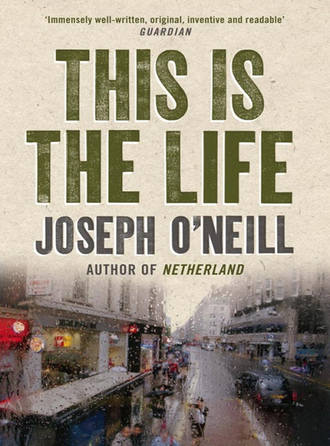
Полная версия
This is the Life
A friend of mine of around this time, a girl called Susan Northey, used to lecture me on the deficiencies of my eating habits, drawing particular attention to the amount of saturated fats I consumed. According to her – and she was armed with all sorts of figures to support her case – I was on the way to a massive heart attack. Occasionally Susan would cook for me, but her efforts rarely met with success. The idea of preparing my food depressed her, especially if I arrived at her flat slightly late.
This happened the night after I had spoken to Oliver. It was a Friday night, and after we had finished eating she started crying.
‘Why am I doing this? I feel like a housewife. Jimmy, look at you, you’ve come in and sat down and wolfed your plate clean without a word.’
I stared guiltily at my plate. ‘Here, I’ll do the washing up. Leave that to me,’ I said.
‘I’ve got a migraine, my head feels as though someone’s split it open with an axe.’ Then she suddenly snapped. ‘Don’t touch those dishes, I’ll do them tomorrow.’
I said, ‘No, let me …’ but Susan angrily barred my way to the sink, so I retreated. I said, That was delicious, Suzy, thank you very much.’
‘It was terrible, it made me feel sick.’
‘Perhaps it did need a little more olive oil …’
‘I don’t believe what I am hearing: I cook you dinner and all you can do is criticize?’ She was furious. ‘Why don’t you cook, if you’re so good at it?’
‘I wasn’t criticizing, Suzy, I was just trying to be constructive. That was delicious, my love, I swear it.’
‘Don’t lie to me, Jimmy, I can’t stand it. It was terrible, and you know it. You just ate it because you’re a pig. You’ll eat anything you find in your trough.’
At this point I should have kept quiet. ‘Well, all right then, I’ve tasted better tuna salads,’ I conceded. ‘But there’s no need to get so worried about it, it’s only a meal. Let’s put it behind us, shall we? I’ll do the cooking in the future, all right? It obviously upsets you if you do it. Suzy?’
Susan was not speaking. She pulled on yellow rubber washing-up gloves and began brushing down the knives and forks that sprouted from her foaming left hand. I made a noise of protest but stopped when I saw her expression. Then I said something but received no reply. She just continued scrubbing down plates. I sighed: I hate scenes.
I decided to give it time and to wait quietly on the sofa. Hopefully things would blow over. Just as the programme on television caught my attention and I began concentrating on it, Susan spoke again. She said things were not working out and that perhaps it would be best if I went. I reflected for a minute and found that I agreed with her. There was little point in prolonging the evening. I collected my things and quietly left. I suppose that you could say that we broke up at that point. I walked to the tube station feeling – wonderful. Coasting along the buoyant pavements with a warm city breeze in my face and a navy blue, starred sky overhead, I felt I was being returned home on a yacht. I was breathing in and breathing out, and it elated me. It is a simple thing, my elation, but then again, is not quite as straightforwardly obtainable as it might sound. My life is so shot through with distractions, so plagued with interferences, that only rarely am I conscious of something as simple as the action of my lungs, of the fact that I, James Jones, am here, kicking around on this amazing planet. By avoiding the mazes of family life and the side-tracks of ambition, I have tried to take an undeflected, eventless route through the days, to dodge the clutter of incidents that bear down on me from every direction. There is only so much I like to have on my plate – too much at once, and everything begins to lose its flavour. When it comes to personal experiences, I prefer to eat like a bird.
It will be appreciated that, by my standards, this last year has been a complete blowout. On top of my usual diet of occurrences I have been forced to feed on the jumbled broth of Donovan, his father, Arabella, her lawyers, Susan and all their unpalatable, over-rich problems. It must be understood that I am not regurgitating all of these matters to indulge myself. It is not as if I am suffering from some kind of empirical bulimia. Despite the fact that, like most people, I enjoy the odd trip down memory lane, I am not one of these people obsessed with bygone days, those who compulsively inhabit the past as though somehow it housed the real world, as though newly minted, uncirculated days rolled around at a dime a dozen. No, you would not catch me relegating the solid, wonderful here-and-now in favour of the olden times. The only reason that I am chewing over these last months is that I want them digested and over and done with, because at the moment they continue to spoil my stomach for everyday things. The office seems drab and unreal, and still I am numb and listless and fatigued. So much so that June is beginning to show signs of impatience, and rightly so. She has enough to do without worrying about me.
‘Come on now,’ she says. ‘Stop moping.’
‘I’m not moping. I’m thinking.’
‘Well then, stop thinking then,’ she says. June will take no nonsense. ‘Start working instead. I’m getting a little tired of fielding these complaining phone calls.’
‘Who’s been complaining?’
‘Mr Lexden-Page for one. He’s rung three times this morning already.’
I groan, but this news does nothing to invigorate me. I take up my scissors and start snipping the thin air again. June thinks of saying something sharp but decides against it. Instead she emits a scolding humph! and struts back to her desk and clamorous telephone. But her disapproval has no effect on me. The fact is, my energies only return when I go back to these last months and, specifically, to the moment when Michael Donovan re-entered my life for real, in the flesh.
FOUR
On Friday night, then, Susan and I split up. The following Tuesday (4 October), I returned to the office from the kiosk where I buy the prawn and mayonnaise sandwiches I eat for lunch. On my desk June had left a list of telephone callers: Mr Lexden-Page, Miss Simona Sideri, Mr Donovan, Mr Lexden-Page again, and Mr Philip Warnett. Systematically I returned the calls (I derive a satisfaction from ticking these things off) until I reached the name Mr Donovan. Irritatingly, there was no message beside the name, only a telephone number.
‘June,’ I called over to her, ‘what did Mr Donovan want, do you remember?’
‘I don’t know,’ her voice came back. June sits out of my sight in an antechamber annexed to my office. From where I sit I can just hear the tip-tapping sound she makes on the computer keyboard and, if it is quiet, the small din of her teaspoon whirling sugar in her drink. ‘He just asked if you would call him back.’
Usually in such a case, when I have no idea who the caller is or what he or she wants, I leave the ball in the caller’s court and wait for a second communication. That day, however, I was anxious to get as much done as possible and scrupulously I dialled the number June had written on the scratch-pad. My call belled three or four times, then I heard the click of an ansaphone whirring into action. A throaty and charming voice, a woman’s voice, said, I’m afraid no one is in at the moment, but if you would like to leave a message, please speak after the tone. Bye!
I dislike these gadgets and leaving the frozen little communiqués they demand. I spoke stiffly into the mouthpiece. ‘Yes, this is James Jones of Batstone Buckley Williams. I am returning Mr Donovan’s call. Kindly contact me’ – I hesitated and, acutely aware of the irrevocable recording of my every silence, stumbled out an inelegant, incoherent finish – ‘if you wish to, to avail yourself of my, my firm’s services or otherwise.’
After that misadventure my face and torso felt hot, and I walked over to the kettle to make myself a coffee for which I had no thirst to take my mind off the incident. As I waited for the water to boil, my telephone sounded.
‘I have a Mr Donovan for you.’
I groaned to myself. He must have been using his answering machine to filter his incoming calls.
The voice said, ‘James, it’s me, Michael.’
Michael? ‘Ah yes, how are you?’ I said. Michael who? I thought.
‘James, I need your services. You do family law, don’t you? Matrimonial? You know your way about it?’
‘Yes, I …’
‘Good,’ he said, ‘then you’re just the man I need. When can we meet? Thursday – does Thursday suit you? Could you squeeze me in at, say, three o’clock?’
I was in danger of being steamrollered into an appointment with a stranger who claimed to know me. Then it clicked: that self-assured, irresistible tone? Surely not …
My tongue stumbling in my mouth, I said, ‘Excuse me, but I wonder if I might set something straight in my mind: I’m speaking to Michael Donovan of 6 Essex Court, aren’t I? It’s just that I have a bad line and I can’t hear you very well.’
‘The very same. Sorry, I should have explained; you’ve probably forgotten me after all these years.’
I laughed nervously. ‘No, no, no, it’s just that the line is poor … Now then,’ I said, changing the subject quickly, ‘Thursday you said? Let me just check. Yes, that would be fine.’ What was I saying? Thursday was not fine at all, the page in my diary was turquoise with meetings. Thursday was terrible. ‘Three o’clock? Yes, I can manage that. No problem at all.’
Donovan said, ‘Excellent. See you the day after tomorrow, then.’
The harsh tone of the disconnected line droned in my ear.
Michael Donovan! Michael Donovan had telephoned me!
My head suddenly weightless, I went to make myself that coffee, this time because I felt like drinking it. Back in my revolving chair with a hot mug warming my fingers, I spun round towards the window. I put my feet up on the window-sill, my toes in line with the rooftops across the road. I basked. So Michael had not forgotten me, after all. He knew that I was right here, at Batstone Buckley Williams. Joyously I swung my feet off the sill and walked over to the basin to rinse the coffee stains out of my mug. Of all the solicitors available to him, Donovan had turned to me. So, I had impressed him with my work. My long hours of painful, unpaid, meticulous research had made their mark, the mole had finally received his dues. Donovan remembered me, even after all these years, as someone he could trust; someone he could count on.
‘June,’ I said brightly, ‘please arrange Thursday to accommodate a three o’clock visit from Mr Donovan.’
‘What about Mr Lexden-Page? You know how he is.’
‘Mr Lexden-Page, June, can be rescheduled.’ Lexden-Page had tripped over a protruding paving-stone and was pursuing the responsible local authority in negligence for (a) damages for pain and suffering in respect of his small toe, and (b) the cost of an extra shoeshine arising from the slight scuff his shoe had received. Lexden-Page could wait.
I returned to my desk and rested the back of my head on the pillow my hands made. What could Donovan want? I asked myself. Then I thought about something completely different, if at all.
The morning of that Thursday saw me relaxed and confident. I wore an attractive blue shirt and my best pure wool suit. Although my desk was an iron one and my carpet was worn down by the chair-legs, it struck me that my office was not unprestigious. It was spacious and it enjoyed a fine view. Looking around it with a freshened eye, I felt a little pang of pride: there were more inconsequential stations in life than the one I occupied. With this office and with customers like Donovan, you had to admit that I was not doing that badly.
But I grew jumpy as three o’clock drew nearer and nearer. Drinking coffee after coffee, I watched the office clock show fifteen-hundred, then fifteen-ten, then fifteen-twenty-five. When, at a quarter to four, I returned from a visit to the lavatory, there it was, Donovan’s silhouette against the window.
‘Hallo,’ Donovan said, standing up with a smile. ‘Sorry I’m late. I want you to have a look at this.’ He reached into a slim briefcase and handed me a sheaf of papers. ‘It came two weeks ago.’ Then he sat down.
I moved into the room. It was as though the last decade had never happened.
I read what he had given me. It was a Petition for divorce. The Petitioner was Arabella Donovan.
‘I see,’ I said.
I leafed through the documents for a second time. The marriage had broken down irretrievably, alleged Mrs Donovan. The Respondent, Donovan, had behaved in such a way that the Petitioner could not reasonably be expected to live with him.
‘Yes,’ I said.
Then I suggested a cup of coffee and picked up the telephone to speak to June. I could easily have simply raised my voice for some, but that would have been undecorous. ‘Do you still take it black, no sugar?’ I asked.
‘That’s right,’ Donovan said, with a note of something – admiration, I think – in his voice.
June came in with a steaming tray and a splashy, red-mouthed smile. June is a tall black girl who used to long-jump for England when she was eighteen, and when she enters a room with her long, spectacular legs she tends to bring things to a standstill. While she poured the coffee, I took another look at Donovan, who was patiently waiting for his cup to fill. He was sitting with his legs crossed. His green eyes, and the skin around them, appeared rested, and his black, thick hair was positively glossy. His unexceptional, off-the-peg suit hung well on his large frame. What really caught my eye, though, were his hands, folded in his lap. They were in perfect condition. They were like the hands that hold the cigarette packets in the advertisements, manicured yet manly, good hands, hands you felt like shaking – the hands of an airline pilot or a surgeon, someone you could trust with your life.
How well he looked, I thought. And then it came back to me. His calmness. I had forgotten that Donovan was, above all, calm. And it was the best kind of calmness, profound and reassuring – it was a tranquillity, a serenity. Don’t worry, it communicated, everything is in hand. Everything is going according to plan. It also said, implicitly, leave everything to me; leave everything to me and everything will turn out well. It was this stillness that gave Donovan his authority, that subtly turned his suggestions into commands. Even then, as I watched him waiting for his coffee cup to fill, I felt the impulse to yield, to drop the reins.
When June had gone Donovan retrieved the papers from me and pointed to a passage in one of the pages. ‘I’m not experienced in this area, so I’m curious to know how often you come across these kinds of allegations.’ He was referring to the section in the Petition headed Particulars. Here Donovan’s culpable behaviour was particularized and broken down into sub-paragraphs (a), (b) and (c).
I was nervous. I said, ‘I must say, they are not commonplace. But I would not say that they were unusual, either.’
Donovan smiled at me and stood up. He began walking unhurriedly around the room. Hallo, I thought. He never used to pace around. Or did he?
He spoke gently. ‘I intend to contest this petition.’ He paused, indicating the arrival of a different point. ‘In my view there are good prospects of defeating it. My wife will not be able to substantiate her allegations, which in any case are unspecific, arguably to an unacceptable degree.’ He looked at me over his shoulder with his green eyes and resumed his pacing. ‘I think you will agree that the tone and content of the pleading are unconvincing.’
I broke a silence. ‘Yes,’ I said.
He continued slowly striding, and for the first time I noticed the inefficiency of his physical movements. He was not clumsy (this would have not been surprising, given that he was a biggish man), he was simply uneconomical with the way he transported himself. He took irregular steps across the room, he swung his arms by his sides with no particular coordination.
I cleared my throat. ‘I don’t have to tell you what my standard advice to clients is in this situation. Contesting a divorce is an expensive and usually fruitless business. We must try and settle this thing as quietly as possible. The last thing we want is a courtroom confrontation.’
Donovan smiled. ‘Yes, I’m aware of the standard advice.’ He picked up his coffee from my desk and regained his seat. Would it not have been simpler for him to sit down first and then pick up his coffee?
The conference, meanwhile, was becoming untidy. It had an unsatisfactory shapelessness about it. We were making confused advances. It was time to get systematically to grips with the issues, the nitty-gritty. I wanted to go back to what Donovan called the standard procedure in meetings of this kind. There were things I needed to know. I needed to know the history: what had prompted Mrs Donovan’s departure from the family home? How much, if any, truth was there in what she alleged? Were there any incidents which his wife might seek to rely on? What were the main obstacles to reconciliation? Was Mrs Donovan in employment? If so, how much did she earn? I needed to know about the financial arrangements of the parties, about the prospects of reconciliation. I needed to know the facts, all of them, and set them out in a row so that I could understand them. Divorce is an extremely complex area, factually.
So I said, ‘Michael, before we go any further there are certain things you need to tell me about Mrs Donovan – about your wife – so that I am able to advise you properly.’ I took out a pen and a fresh pad and wrote Donovan v. Donovan on the cover. ‘Now, firstly, where is your wife at the moment?’
‘At her mother’s house. James, I would love to go into the details but I’m afraid that I’ve got to rush in a minute or two.’ He looked at his watch. ‘Perhaps we could arrange another con – I’ll get Rodney to ring. In the meantime, I wonder if you could serve this on my wife.’ Donovan dipped into his briefcase and brandished some documents. ‘It’s an Answer to the Petition. I’ve left it in general terms for the time being – simply denying her allegations, not making any counter-allegations of my own. There’s no point in restricting our options by pointing any fingers right now.’
I read the Answer. It was exactly what was needed, and I opened my mouth to say so.
‘As regards reconciliation or settlement,’ Donovan said, ‘I think it would be wise to shy away for a while. My wife is not, I should imagine, in a particularly constructive mood at the moment. I think a low-key approach is called for, at least for the time being. Let them make the running. What I have in mind is this: we are more than willing to talk, but only with a view to reconciliation. Certainly, I will not contemplate settlement on the basis of consenting to the divorce. Apart from that, we play it by ear. Take no initiatives unless instructed.’ Donovan opened his case, replaced some documents, and shut the lid with a dull slam of leather. ‘There’s nothing else, is there?’
‘No,’ I said, standing up, thinking, Yes there is, there’s a lot else.
‘Good. James, you’ve been very helpful.’ Donovan began putting on his coat and scarf.
Feeling that a little bit of small talk might be appropriate at this juncture, I asked, ‘How are you feeling? I hear you’ve been unwell recently.’
‘Have I?’ He buttoned his navy blue coat. ‘Oh, yes – that. Yes, I’m a lot better now, thank you, how about you?’
‘Fine, fine. Couldn’t be better.’
‘Just look at that rain,’ Donovan said.
When Donovan left I walked over to the window and watched him hail a taxi. It was four o’clock and already the headlamps shone from the cars. The sky was brown, the rain brilliant under the street lights and, suddenly, everything had become palpable and atmospheric. This was the thing about Donovan – a brightness followed him around, a clarity, it was as if the man moved with Klieg lights tracked down on him …
Arabella Donovan was a nice name. Arabella Donovan, I said to myself; it was almost a supernatural name, you could call a spangled mermaid Arabella Donovan. That peachy voice on Donovan’s answering machine, that must have been Arabella’s voice. I went back to my desk and looked at her photocopied signature on the Petition. It looked a functional signature to me. The letters were printed clearly and regularly. There was no indulgence about the signature, no squiggles or sequins. It was a little disappointing. It seemed a waste of such a nice name. June – June would have done the name justice with her turquoise ink and her fancy, wavy manuscript.
How on earth had Donovan allowed Arabella to slip through his fingers? And what had made Arabella leave someone as eligible as Donovan? What had happened?
I turned once more to the salient points of the Petition. Paragraph I said that the Donovans had married on 5 July 1981. Paragraph 4 said that there were no children born to the Petitioner during the said marriage or at any time. Paragraph 6 revealed that the Petitioner had quit the marital home on 14 July 1988, and at Paragraph 8 it was alleged that Donovan had behaved in such a way that Arabella could not reasonably be expected to live with him. Then I looked again at the Particulars of this allegation.
The Respondent has throughout the marriage treated the Petitioner cruelly and/or unreasonably by inter alia
(a) persistently degrading the Petitioner by his conduct so as to make her feel worthless and/or by
(b) injuriously neglecting the Petitioner by according unreasonable priority to other matters inter alia his occupation and/or by taking no or no sufficient interest in the Petitioner’s welfare and/or by
(c) persistently maintaining prolonged and unreasonable absences from the marital home.
I had my doubts about the logic of the pleading and the vague language it employed, but I could guess at the gist of Arabella’s complaint. Donovan, she said, was a cruel and neglectful husband. That was what it boiled down to.
I regained my seat. On balance, Donovan was right to feel he had a case. The pleadings did not specify the form of the degradation from which Arabella was supposed to have suffered, nor (apart from the matter of the excessive hours he put into his work) were examples given of any maltreatment. Allowing for the customary emotive exaggeration of Petitions, no tangible or damaging misconduct was immediately revealed. There was no suggestion of infidelity or physical violence or of something you could get your hands on, like alcohol or drug abuse, and there was generally an unconvincing amount of huffing and puffing in the pleading; in general, the tactic is to make your case as precise, and therefore as strong, as possible, thereby strengthening your hand for out-of-court negotiations. In this case, the only thing revealed was that Donovan had devoted too much time to his work, hardly the most malevolent of transgressions.
But that was where my understanding screeched to a halt. I rely on information, not intuition. Ferreting out facts from clients, a matter of technique and persistence, I am usually good at. Dates, events, examples, these are things I happily manage. In this case, however, I hardly knew any facts at all. Donovan had disallowed my interrogations, and I was forced to fall back on guesswork: and when it came to sensing the unsaid, to divining what lay beneath the surface, I was weak. I am not, it must be said, greatly interested by those parts of a personality known as the depths. I am happy to take people at face value, with the result that sensitivity to concealed thoughts and emotions is not my strong point. I am a magpie in this respect, drawn towards trinkets and sparklers – more attracted to a person’s superficies, with its gaudy bijouterie of individual traits, than to his or her ‘deeper’ self. Underneath the make-up and knick-knacks, I must confess, I tend to find people wearisome and monotonous, burdened as they are with the same luggage of troubles. And as a solicitor, of course, faced as I am every day with personal problems, I must keep a certain distance. It would not do to become involved.







